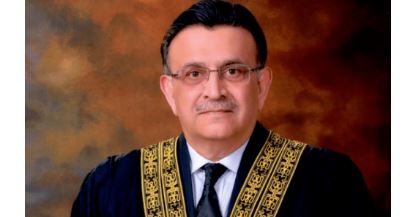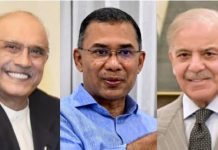ISLAMABAD, JUL 25: Chief Justice of Pakistan (CJP) Umar Ata Bandial, while hearing a petition related to the recently held Punjab chief minister’s re-election, remarked on Monday that the party head “will also have to listen to the parliamentary party’s opinion”.
He made the remarks during the hearing of a petition filed by PML-Q leader Chaudhry Parvez Elahi challenging Punjab Assembly Deputy Speaker Dost Mohammad Mazari’s decision in the chief minister’s re-election last week, which led to Hamza Shehbaz’s victory.
During the re-election, Mazari had decided against counting the votes of 10 PML-Q lawmakers, which were cast in Elahi’s favour, citing a letter written by PML-Q President Chaudhry Shujaat Hussain in which he had instructed them to vote for Hamza instead.
A three-member bench, comprising Justices Bandial, Ijazul Ahsan and Munib Akhtar are hearing the petition. During the previous hearing on Saturday, they had allowed Hamza — who was re-elected on July 22 — to remain “trustee” chief minister till Monday (today).
There was a flurry of activity even before today’s hearing began as the coalition government reiterated its demand for the formation of a full court bench to hear cases related to hear the case related to the Punjab chief minister’s election.
At the same time, an Islamabad police official said only leaders of respondent parties would be allowed to enter the court premises with the permission of the SC administration.
He added that lists of leaders had been provided by political parties in this regard. “No rally, procession or gathering will be allowed in the Red Zone, including around the Supreme Court.”
Former SCBA chief asks for full bench
At the outset of the hearing, the bench called former Supreme Court Bar Association (SCBA) president Latif Afridi to the rostrum.
The chief justice observed that several former SCBA presidents were present in the courtroom. The ongoing case was directly related to the SC’s interpretation of Article 63-A, he remarked.
Afridi said the country’s current political situation was “very complicated”.
“Our former presidents held a meeting. The SCBA’s petition for review [of the Article 63-A interpretation] is pending adjudication,” he informed the court.
Meanwhile, Afridi pointed out that cases challenging the Election Commission of Pakistan’s (ECP) decision to de-seat lawmakers over defection were also being heard.
A full-court bench should be formed to avoid a constitutional crisis, he requested the court. “The crises are deepening. The entire system is at stake.”
He requested the SC to form a full-court bench to hear all the cases together.
The deputy speaker’s lawyer, Irfan Qadir, also requested the court to constitute a full bench. At this, the CJP asked him the grounds on which a full court bench should be constituted.
Qadir requested the bench to read paragraphs one and two of its decision on the presidential reference seeking interpretation of Article 63-A, stating that everything would then be clarified.
“We aren’t here to fight,” he added.
‘Difference between political party and parliamentary party’
Article 63-A could not be read individually, Qadir argued. “The party head issues instructions to [members of] a political party.
“Political parties have an important role in parliamentary democracy. The democratic system can be endangered due to the weakness of political parties,” he continued.
Qadir termed defection from party policy a “cancer”.
Justice Ahsan observed that only the members who were part of the assembly were included in the parliamentary party. “There is a difference between political party and parliamentary party,” he remarked.
The judge questioned whether the same person could issue a declaration as well as instructions to the parliamentary party.
He remarked that the Constitution was clear regarding the declaration of defection.
Hamza’s lawyer, Mansoor Awan, informed the court that he had already submitted his client’s statement.
The chief justice asked which part of the SC verdict the deputy speaker referred to in his ruling. “Where is the paragraph on which the deputy speaker relied upon?”
Justice Ahsan also asked the same question to which Hamza’s lawyer replied that as per the SC’s verdict, votes cast against party policy would be rejected.
Justice Ahsan then asked if the party leader could also be the head of the parliamentary party.
Awan told the court that the deputy speaker’s ruling had relied on paragraph three of the SC verdict.
‘Parliamentary party’s authority’
Justice Akhtar observed that Article 63-A had been made part of the Constitution through the 14th Amendment and asked the counsel to present his legal arguments regarding the party head.
Awan responded that the 18th Amendment had further elaborated on Article 63-A. “According to the verdict of [former] justice Sheikh Azmat’s eight-member bench, all the decisions are taken by the party leader,” he said.
However, Justice Akhtar said that there were two rules to cast votes in accordance with the party policy. “Prior to the 18th Amendment, Article 63-A used to refer to the party head’s instruction.
“After the amendment, the party leader was replaced by the parliamentary party,” he observed.
The judge stated that there was ambiguity about the powers of the parliamentary party and the party chief prior to the amendment. “Following the amendment, according to Article 63-A, the parliamentary party was given the authority to issue directions,” Justice Akhtar observed.
Justice Akhtar observed there were rules to declare that a decision was against the Constitution.
Hamza’s lawyer contended that the court’s ruling on Article 63-A was contradictory to its previous decisions and reiterated that a full-court bench should be constituted.
“If a five-member bench feels that the previous decision of the court was incorrect, then a full bench can decide,” Awan said.
‘Party head’s dictatorship’
The chief justice recalled that a senior parliamentarian had informed the court during the hearing on the presidential reference that the party head could also be a ‘dictator’ which is why his role had been reduced and powers given to the parliamentary party instead.
“There are hereditary parties in Pakistan. How can a leader residing abroad issue instructions?” he asked.
Separately, Justice Ahsan observed that the Constitution empowers parliamentary representatives. The parliamentary party decides who to vote for in the assembly, he added.
“We protected the assembly members from the party head’s dictatorship in the presidential reference. Several members complained about the party head’s dictatorship,” Justice Bandial remarked.
“The party head will also have to listen to the opinion of the parliamentary party.”
Awan pointed out that the heads of four political parties were not part of the parliamentary party. “JUI-F is named after its head. Maulana Fazlur Rehman (its chief) is not part of the parliamentary party.
“The party head is answerable to the public, not the parliamentary party head,” he argued.
Justice Ahsan remarked that the party head’s role is very important. “It is the party head who decides to send the declaration against defecting members. The parliamentary party will give instructions on who to vote for and the reference is sent by the party head.”
He further remarked that a political party in essence is the same as its parliamentary party. “Those who are elected to the assembly by the public are the ones with the mandate.”
Justice Ahsan referred to the United Kingdom’s system, in which he said the party head had no role in the parliament.
‘Deputy speaker exceeded court’s interpretation’
Justice Ahsan remarked that the deputy speaker, while accepting the court’s decision as correct, referred to it in his ruling.
The deputy speaker’s lawyer, Irfan Qadir, said Mazari had referred to the verdict to the extent of rejecting the votes.
“This means that to the extent that the votes were rejected, the court’s decision was recognised,” the judge noted, adding that the court’s question was limited to whether the deputy speaker’s interpretation of the verdict was correct.
He also observed that the deputy speaker had “exceeded” the court’s interpretation in his ruling.
In the last hearing on Saturday, the court had summoned the deputy speaker but his lawyer had come in his place. The SC had also issued notices to Hamza, Attorney General of Pakistan Ashtar Ausaf, Punjab Advocate General Shahzad Shaukat and the province’s chief secretary.
It ruled that Hamza should work as per the Constitution and law during the time period. “As the chief minister, Hamza Shehbaz will not use his powers for political gains,” it stressed.
Separately, at one point during the hearing, Justice Bandial remarked that prime facie, the deputy speaker’s ruling was against the apex court’s verdict in the Article 63-A reference.
Hamza’s statement
Separately, Hamza’s lawyers submitted a concise statement on his behalf today, which noted that the votes of PML-Q MPAs in Elahi’s favour were disregarded on the basis of party president Chaudhry Shujaat Hussain’s letter.
It also referred to the previous chief minister’s election, held on April 16, in which the PTI had issued similar instructions to its lawmakers. The 25 lawmakers, who had not voted in line with the party’s instructions, had been disqualified by the Election Commission of Pakistan (ECP) and their appeals were pending adjudication, it added.
“This honourable court has held that the party head enjoys a central and decisive role within the party, in the electoral process and in the parliament through parliamentary party which he directly controls and superintends … he has the direct power, influence and control over how the party shall act and function within and outside parliament.”
The statement said that the PTI’s instructions ahead of the first chief minister’s election, which were upheld by the ECP, and the SC’s judgement had formed the basis for the deputy speaker’s ruling.
The Supreme Court had not yet determined the validity of the ECP’s decision, which, combined with Article 63-A (related to disqualification of lawmakers over defection), “justified” the deputy speaker’s ruling, it said.
The statement further noted that if the apex court sets aside the ECP’s decision to disqualify the 25 MPAs, “the effect of that would be the declaration of defection given by party head of PTI dated 18.04.2022 would also be set at naught.
“As a consequence, the 25 votes would not stand excluded from the votes polled to [Hamza] in the first poll held on 16.04.2022. Resultantly, [Hamza], who had received 197 votes (more than 186 required in the first poll i.e. majority of total membership of the provincial assembly of Punjab), would be the duly elected chief minister, Punjab and the consequent second poll dated 22.07.2022 would be disregarded.”
The statement requested the court to constitute a full bench to hear together Elahi’s petition, the petition seeking a review of the SC’s interpretation of Article 63-A and appeals against the ECP’s decisions.
It also requested the court to dismiss Elahi’s petition.
PML-Q, PPP and JUI-F file petitions
Earlier today, the PPP, Jamiat Ulema-i-Islam-Fazl (JUI-F) and PML-Q filed separate petitions requesting the apex court to allow them to become parties in the case.
A petition filed on behalf of the PML-Q and its head Chaudhry Shujaat Hussain stated that instructions had been issued to all MPAs to vote in Hamza’s favour and a letter in this regard had also been sent to the deputy speaker.
Contrary to the orders, the MPAs had cast votes in Elahi’s favour which were disregarded by the deputy speaker, it noted.
“The petitioner (Elahi) has filed the instant petition challenging the ruling of the deputy speaker Punjab Assembly but has, for reasons best known to him, not impleaded the interveners who are the most important and necessary parties.”
In its petition, the JUI-F stated that the SC’s decision to summon Deputy Speaker Mazari “which was unprecedented and demeaning” to the office he holds.
“To curtail the powers of a constitutional office of chief minister through an interim order and that too without a constitutional or legal backing, will set a bad precedent for the constitutional courts and further deteriorate harmony among institutions.”
The petition also requested the apex court to constitute a full bench to hear the petition.
Separately, the PPP stated in its petition that since seven of its MPAs had voted for Hamza in the re-election, the party would be affected by the court’s decision on the petition and thus, should be allowed to become a respondent in the case.
“Refusing to hear the applicant would be oppressive to judicial conscience and would cause a perpetuity of injustice which would not be tolerated by a just judicial system.”
The election
During the election on Friday, Mazari rejected all 10 votes cast by the PML-Q on the pretext that they had violated the orders of their party chief, Chaudhry Shujaat Hussain, citing a letter he received from the patriarch which said he was asking his party lawmakers to back Hamza.
After counting the polled votes, the deputy speaker announced that Elahi bagged 186 votes, while Hamza could get 179 votes. However, he refrained from declaring Elahi the chief minister.
Instead, he indicated that as party chief, Chaudhry Shujaat Hussain’s instructions to PML-Q members to vote for Hamza instead of Elahi held greater sway.
The deputy speaker then announced that Hamza had won the election of chief minister, since the 10 deducted votes reduced Elahi’s tally to 176, while Hamza remained on top with 179.
Elahi’s plea
In his petition, Elahi has requested the court to hold the deputy speaker’s ruling leading to Hamza’s re-election as “bogus and false”.
“Hamza Shehbaz may kindly be declared disqualified as the Punjab chief minister/ member of the provincial assembly,” the petition read.
It requested the court to declare the deputy speaker’s decision to discard the votes of 10 PML-Q lawmakers on grounds of Article 63-A of the Constitution as “unconstitutional”.
Instead, the petition said, the court may declare Elahi the “lawful returned candidate” and the PML-Q leader be allowed to take oath as the Punjab chief minister.
The petition further stated that Hamza should be restrained from taking the oath as the chief minister. It is pertinent to mention that Hamza had already been administered the oath of office by Punjab Governor Baleeghur Rehman earlier on Friday.

















